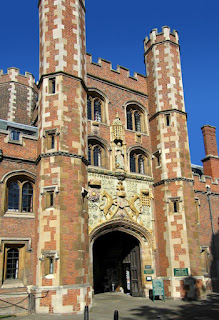This is more a goal-setting exercise since I'm not a big fan of resolutions. I am more likely to keep plugging away at a goal but once a resolution is broken, it seems like my mind goes, "oh well" and it's all over. Several other genealogy bloggers have posted resolutions for 2013 and I'm hoping the goals give me more focus than my typical ADHD approach to genealogy. I tend to start researching one thing and then some interesting story/web site catches my eye and I'm off on a tangent that may not even pertain to my own family tree. So here are my resolutions:
- Research with focus: Choose a relative and conduct systematic research...and document the research steps taken so I don't accidentally re-do fruitless searches.
- Blog with regularity: I will strive for at least 1 post per week and 100 posts for the year. I didn't start until late February and have a little over 80 posts for 2012 so this seems realistic. My posts seem to come in clumps with some long gaps of inactivity. This will be difficult to remedy given the other demands on my time but I'll make an effort. Does anyone have any good ideas on how to handle the busy times when your blog takes a backseat to life?
- Trim the tree: I will continue to work on documenting and verifying my ancestors with an eye toward eliminating errors.
- Solve at least one brick wall: The first step will be to create a blog post about a few of my stubborn brick walls in hopes of finding someone who can help with suggestions or information to further my research.
- Pictures: I want to work on scanning pictures that may be in the possession of various family members to preserve them for future generations. Hopefully, I will also get some good stories from talking to the relatives while the pictures are being scanned.
I think five is a good number for my first attempt at annual genealogy goals so I'll stop here. I could go on and on but then I think I would just set myself up for failure. Stay tuned for progress updates! Thanks to Vintage Kin for the clip art!
Need some inspiration? Check out these links.
Legacy Family Tree Resolutions
Cousin Bill West's Review of his 2012 Goals
Olive Tree Genealogy 2012 Resolutions
10 Genealogy Resolutions
Legacy Family Tree Resolutions
Cousin Bill West's Review of his 2012 Goals
Olive Tree Genealogy 2012 Resolutions


















































